Index to Parts 2 and 3
A.
Adab, city, 123, 23.
addi, wailing, 117, 31; 137, 22; 161, 12.
aḫu, brother, 212, 36.
Aja, goddess, 198, 9.
al (giš), al-gar (giš), a musical instrument, 187–191. See also No. 20 Rev. 7–12. al-bi, compound verb, 189 n. 6. In Ni. 8164 (unpublished) al-gar, al-gar-balag in list with (giš)-á-lá, also an instrument of music.
alad, protecting genius, 154, 18.
ameliš, like a man, 215, 25.
Amurrû, god. Psalm to, 118; 119.
angubba, sentinel, 180, 14.
Anu, god. 116, 18:26 ff. 131, 8; 165, 9; 180, 20.
Anunnaki, gods, 114, 17:21; 116, 25; 116 n. 7; 128, 13; 135, 31; 189, 21.
Anunit, goddess, 158, 12; 166, 2.
apunnatu, nostrils, pitiḳ, apunnāti, 217, 28.
aṣṣammim (?), 215, 18.
Arallû, 132, 26; 134, 7.
arāmu, cover, 198 n. 2.
arāḳu, be pale, Prt. iriku, 217, 31.
arḫiš, quickly, 199, 28.
Aruru, goddess. Lamentation to, 115. Sister of Enlil, 115, 2; 171, 29; 190, 25. Other references, 116, 13:15:18; 117, 34 f.
Asarludug, god, 163, 8; 170, 4.
Aš-im-ur, title of Moon-god, 136, 12. áš omitted, No. 19, 2.
aš-me, disk, 133, 38.
Ašširgi, god, No. 22, Rev. 7.
Azagsud, goddess, 196, 30:33; 197, 38.
B.
Babbar, god, 116, 24; 139, 43; 147, 21; 148, 3; 152.
Babylon, city, 158, 14; 160, 6; 163, 8; 166, 4:11.
badara, see 200 n. 2. badarani, a weapon, 133, 36.
balag, lyre, 138, 52.
bansur, table; title of a goddess, 175, 3.
Bau, goddess, 179, 2; 181, 30; 182, 32; 141, 7:10.
bišîtu, condition, 215, 14.
bi’u, cavern, 196, 29.
bulukku, crab, 174, 5.
burgul, engraver, 185, 8.
C.
Cutha, city. Center of the cult of Nergal, 167, 15.
D.
Dada, god, 192, 6.
Dagan, West Semitic god, 149, 21.
Damu, title of Tammuz, 176, 7.
Deification of kings, 106–9; 127 n. 1.
dêpu, shatter, 195 n. 16. [222]
DI-BAL, ideogram in incantations, 194, 10.
Dilbat, city, 167, 16.
Dilmun, land and city, 112, 2:4.
dimgul, dimdul, master workman, 150.
dingir-gal-gal-e-ne, the great gods, the Anunnaki, 114, 21:125; 149, 19.
dumu-anna, daughter of heaven, title of Bau, 179, 5; 181, 28; 184, 28.
dumu-sag, title of Tašmet, 163, 12.
Dungi, king of Ur, liturgy to, 136.
dupšakku, trencher basket, 216, 17.
Duranki, epithet for Nippur, 122, 18; 180, 11.
E.
E-anna, temple in Erech, 123, 30; 125; 148, 12; 213, 18.
E-babbar, temple of the sun god, 152; 158, 11; 166, 1. Perhaps read E-barra.
E-daranna, temple of Enki in Babylon, 169, 25; 170, 29. See BL. 133.
edēlu = edēru, be gloomy, 216, 10.
é-dub, house of learning, 117, 39.
é-gal, palace, No. 19, Rev. 3; 115, 11; 131, 7; 134, 22; 158, 9.
é-gig = ḳiṣṣu, 191, 11.
E-ibe-Anu, temple in Dilbat, 167, 16.
E-kinammaka, temple, 115, 10.
E-kišibba, temple in Kish, 166, 13.
E-kur, temple, 180, 12; 183, 23; 190, 7; 146, 9; 147, 17; 158, 8; 160, 4; 166, 17; 169, 23.
Emaḫ, Ešmaḫ, ritual house of the water cult of Marduk, 163, 7; 115, 4.
E-malga-sud, temple, 181, 24; 141, 3.
E-meteg, daughter of Ninkasi, 144.
E-mete-ursag, temple in Kish, 166, 13.
E-namtila, temple, 160, 4; 169, 24.
en-a-nu-un, en-á-nun, title of Innini and Gula, 173, 2.
Enbilulu, title of Marduk, 170, 5.
E-ninnû, temple, 181, 22.
EN-ḪUL-tim-mu, 194 n. 2.
EN-KA-KA, bêl dabābi, 194, 2.
Enki, god. Hymn to, No. 20, 113, 7; 114, 10; 116, 21; 122, 7; 149, 16.
Enkidu, satyr, 213, 3:7:10:11; 214, 6; 215, 11:12:15:34; 216, 13; 219, 8:15:25; 131, 11; 134, 16; 178, 13.
Enlil, god. Liturgy to, 155–184. Regarded as god of light, 157, 1 ff. 158, 3 f. Other references, 114, 19; 115, 2; 116, 19; 131, 6; 136, 5; 139, 40; 149, 22; 146, 3:7:14; 189, 11:19; 220, 33.
Enul, god, 149, 16.
Enzu, god, 139, 41; 146, 3.
epšānu, deeds, 218, 18.
epû, be dark, I² itêpû, 196, 29.
Erech, city, 125; 149, 13. Erech ribîtim, 212, 28; 213, 15; 217, 19:21; 217, 3:6.
eri-azag, holy city, Isin, 141, 8.
erida, title, 175, 1.
Eridu, city, 113, 20; 136, 13.
Erishkigal, goddess, 131, 10; 134, 11.
eršagtugmal, penitential psalm, 118.
E-sagila, temple, 152.
E-sakudkalamma, temple, 166, 10; 169 n. 4.
ešendili, a title, 177, 10. [223]
eškar, fixed tax, 188, 9.
eš-lal, a sacred place, 161, 14.
E-temen-anki, temple, 169, 25.
E-turkalamma, temple, 166, 14.
Euphrates, river, 183, 12; 183, 20.
E-zida, temple, 166, 12.
Ezina, grain goddess, 174, 9.
Ezira, reading of the divine name KA-DI, 177, 11.
F.
Fara, modern Arabic name for the site of Isin (?), 177 n. 4.
G.
GAB, baked bread, 200, 33.
GAB-LAL, a cake made with honey, 195, 22; 200, 35.
GAR-šunnu = epišan-šunu, 198, 13.
gašan-gula, title of Ninâ, 119 n. 2.
gepar, dark chamber, 123, 30 f., 148, 10; 161, 18.
Gibil, god, 197, 3.
gi-gál(giš),interlude, 151 n. 1; 182, 33.
gigunna, 114, 23.
Gilgamish, king of Erech, 207; 211, 1:115 f. 212, 17:37; 213, 2; 217, 21; 218, 9:20:24:29 and below 2; 219, 10;15:20:26. Derivation of name, 208. See also No. 16 Rev. II 15; 197, 42; 124 f.
gilsa, a sacred relic, 132, 22.
Girra, Irra, god, 174, 7; 177, 12.
girru, lion, 215, 29.
Girsu, city, 181, 23.
Guanna, deity, No. 16 Rev. II 18.
Guedin, province, 129, 28.
Gunura, goddess of healing, 176, 6.
gupru, mighty, 214, 33.
Gutium, land, 120 ff.
H.
Hallab, city, 125; 141.
ḫanābu, grow thickly, Prs. ibannib, 219, 4.
ḫapāpu, embrace, 212, 34.
ḫaṣṣinu, axe, 212, 29:31.
ḫarbatu, waste place, 200, 39.
Harsagkalamma, temple, 166, 14.
Hubur, mythical river, 197, 42.
ḫûlu, a bird, 199, 31.
ḫûḳu, a bird, 199, 31.
I.
Ibi-Sin, king of Ur, 151 n. 2.
ibsi, liturgical expression, 120, 5.
Igigi, heaven spirits, 116 n. 6.
IGI-NAGIN-NA, 194, 11.
imib, weapon, 131, 8. mi-ib, ibid. n.3.
imin, seven. Seven lands, 130, 35; seventh day, 134, 18.
Immer, god, 177, 8.
Indag, god, consort of Gula, 173, 3.
Innini, goddess, 123. Liturgy to, 184; 123, 29. Consort of Shamash, 148, 4. Other references, 154, 21.
iṣṣur šamê, unclean birds, 195 n. 10.
Išhara, goddess, 218, 22.
Isin, city, 122, 15; 176, 4.
Ishme-Dagan, 178 ff. Son of Enlil, 181, 29; 182, 32. Liturgy to, 143.
K.
KA-DIB-BI, sibit pî, 194, 10.
KAK-DIG, a weapon, 130, 4.
kakkitu (?), weapon. Pl. kakkiatum, 218, 16.
KAK-SIR, a weapon (?), 130, 4. [121]
kalama, the Land, Sumer, 138, 25; 141, 5; 147, 22; 150, 4; 154, 17; 177, 9.
kanami=kalama, land, 120, 8.
KA-NE, a new ideograph, 153 n. 10.
kasû, bind. I² liktisu, 198, 20.
Kenurra, chapel of Ninlil, 114, 22; 123, 20; 160, 4; 166, 18; 166, 8; 169, 24.
Keš, city, 115, 11; 123, 22.
kešda-azag, a relic, 132, 27.
ki, kin for gim = kima, 120, 6.
KI-AG-MAL, râmu, 194 n. 4.
Kidurkazal, daughter of Ninkasi, 145.
ki-malla, to bend. tig-zu ki-ma-al-la nu-gí-gí, “Thy neck wearies not in bending,” 168, 2. [Correct the translation.]
ki-in-gin, ki-en-gin, Sumer, 115, 24; 134, 19; 189, 17.
KI-SAR, ḳaḳḳara tašabbiṭ, 199, 29.
Kish, city, 129, 30; 166, 12. é kiš-(ki)-šú, so read, No. 5 Obv. 8.
Kullab, city, 149, 14; 173, 1.
kunin, gunin, reed basket, 150 n. 3.
kurgal, “great mountain,” title of Sumer, 114, 11. Of Enlil, 114, 19; 182, 5.
KURUN-NA, (amelu), 196, 34.
KUŠ-KU-MAL, 194, 11.
L.
la’aṭu, gore. Prt. ilûdu, 219, 12:17.
labu, panther, 215, 29:32.
Lagash, city, 181, 23:26.
Laḫama, goddess of Chaos, 113, 5.
Laws, promulgated by Dungi, 138, 31.
Libit-Ishtar, king, 141.
libšu, garment, 214, 27:29; 215, 26.
Ligirsig, a god, 113, 3.
lilazag, epithet of a deified king, 141, 1.
Lillaenna, goddess, 192, 5.
limēnu, be evil. II¹ ulammenu-inni, 197, 7.
Lugal-dīg, god, 197, 5.
lu’ûtu, pollution, 195, 19.
M.
Magan, land, 112, 2:5.
mai̭ālu, couch, 218, 22.
malāšu, shear, 195, 20.
Mamit, 200, 41.
mandatu, form, 195, 21.
mal-gar (gi), a musical instrument, 191, 10.
mangu, disease, 195, 19.
Marduk, god, 151.
markasu, leader, 150.
masû, seize, 195 n. 5.
mašû, to forget, 216, 7.
Me-azag, daughter of Ninkasi, 144.
meḫru, fellow, 218, 21.
Meḫuš, daughter of Ninkasi, 144.
Meluḫḫa, land, 112, 6.
Meslam, temple in Cutha, 167, 15.
mesû, a tree, 159, 23.
muk, now, but now, 217, 26.
Mulgenna, Saturn, 137, 18.
Mulmul, gods, 142.
N.
nâdu, water bottle, 198, 17.
nadîtu, temple devotee, 188, 7.
nagû, shout. Prs. inangu, 215, 19.
nâku, embrace, 218, 26.
namaštû, cattle, etc., 213, 12:17; 214, 1; 219, 14.
Namtar, god, 197, 3; 132, 24.
Nangt, goddess, 192, 7. [225]
Nannar, god, 115, 12; 116, 23; 133, 38; 137, 11; 150, 2.
Nergal, god, 131, 6.
Nidaba, goddess, 191.
ni-gál, cattle, 121, 6.
nimir = ligir, 174, 4.
ninda, linear measure, 133, 41.
Ningal, goddess, No. 19, 5; 148, 3; 151, 3.
Ningišzida, god, 133, 34.
Nin-isinna, goddess, 122, 16; 191, 15.
Ninkasi, goddess, 144.
Ninki, goddess, 149, 16.
Ninlil, goddess, 116, 20; 123, 20; 137, 12; 146, 14.
Ninmada, daughter of Ninkasi, 144.
Ninmaḫ, goddess, 116, 22.
Ninmenna, epithet of Damgalnunna, 190, 27.
Ninsun, goddess, 219, 30; 208 n. 6; 129; 131, 16 (?).
Nintudri, goddess, 123, 26. Nintudra, 137, 16. Creatress of man and woman, 192.
Ninul, goddess, 149, 16.
Ninurašâ, god, 191, 12; 146, 12.
Ninzuanna, goddess, 122, 13.
Nippur, city, 112, 8; 122, 18:19; 160, 3; 169, 21; 180, 11; 149, 18; 158, 7; 165, 16.
NI-SUR (amelu), 196, 35.
Nudimmud, god, 199, 25. No. 20, 10.
nugiganna, epithet of Innini, 185, 2.
nûn apsi, unclean fish, 195 n. 11.
Nunamnirri, god, 190, 28; 146, 13; 180, 10:13:17.
nun-ùr, epithet of Amurrû, 119, 3.
Nusiligga, daughter of Ninkasi, 144.
Nusku, god, 146, 7; 163, 13.
P.
Pabilsag, god. Son and consort of Gula, 173 n. 3; 176, 5. A form of Tammuz.
pananumma, formerly, 217, 25.
Panunnaki, goddess, consort of Marduk, 163, 9.
patāḳu, fashion, break, 214, 4.
paturru, a weapon, 200, 37.
Pleiades, 142.
R.
ratātu, demolish, 219, 19.
Rimat ilatNinsun, 208 n. 6; 219, 29.
Ruškišag, goddess, 132, 28.
RU-TIG, an epithet, 141, 2.
S.
sa-bar; sa-sud-da, liturgical note, 182, 31.
šabšiš, cruelly, 215, 30.
Sagilla, temple, 158, 15. E-sagila, 160, 5; 166, 5; 166, 11.
šaḫātu, be astounded, 216, 10. Arabic saḫiṭa.
ṣai̭āḫatu, desire, comfort, 216, 18.
šakāpu, fell. I² išsakpu, 215, 30.
ṣalûtu, enmity, 199, 27.
Šamaš, god, 197, 4:8; 198, 10:13; 199, 25:31.
Šamaš-šum-ukin, king. Incantations for, 193–200; 199, 23.
Samsuiluna, king, 151.
SAR-DI-DA, a relic, 133, 37.
Serpent adversary, 183, 21; 148, 12.
Seven, sacred number. Seven gods, 196, 30.
Ship, in legend, 113, 2.
Silsirsir, a chapel.
Sin, god. Hymn to, No. 19.
sippu, threshold, 219, 13:18. [226]
Sippar, city, 158, 10; 160, 5; 166, 19.
sirgidda, long song, 140, 54.
Siriš, daughter of Ninkasi, 144.
Siriškaš, daughter of Ninkasi, 144.
Siriškašgig, daughter of Ninkasi, 144.
sirsagga, first melody, 117, 28; 139, 48.
ŠU-AN = kat ili, 194, 12. See also ŠU-dINNINI, 194, 12.
ŠU-NAM-ERIM-MA, 194, 13.
ŠU-NAM-LU-GAL-LU, 194, 13.
subura, earth, 175, 3.
su-ud, sú-ud-ám, epithet of goddess of Šuruppak, 177, 10 and note 4.
šuḫuru, hair (?), 215, 23.
sukkal-zid, title of Nebo, 163, 10.
Šulpae, god, No. 16 II 22.
Sumer, land, 113, 21; 114, 11; 136, 2.
sumugan, title of Girra, 177, 12 and note; 179, 3.
T.
Tablet of fates, 132 n. 3.
Tammuz, ancient ruler, 208. Liturgy to, 191. Other references, 126; 208; 131, 20.
tapāšu, seize, capture, II² uttappiš, 215, 31.
temēru, cook, 196, 35.
Tigris, river, 183, 12.
Tummal, land, 190, 9; 191, 10.
U.
ud, spirit, word, 150, 1:4; 158, 16; 159, 17:24.
ul-al-tar, 191 n. 6.
ulinnu, girdle cord, 195, 20.
Ulmaš, temple of Anunit, 158, 13; 166, 3.
Ur, city, 134, 21; 137, 6. Lamentation for, 150. Other references, No. 19, 4:7:8:16:28: Rev. 5; 151, 3.
Ur-azag, king of Isin (?), 140 n. 2.
Ur-Engur, king of Ur, 126 ff.
urinu, spear (?), 173, 3.
ursaggal, epithet for Ninurašā, 165, 11. For Enbilulu, 170, 5.
ušumgal, 117, 33.
Z.
zâbu, flow. li-zu-bu, 198, 16. Cf. gàm = za’ibu, miṭirtu, words for canal, SAI. 691–3.
zag-sal, liturgical note, 103 f. No. 21 end.
za-am, 138, 34; 139, 38; 140, 56.
zênu, be enraged, II¹ uzinu-inni, 197, 6.
ZI-TAR-RU-DA = nikis napišti, 194 n. 6. [124]
Description of Tablets
Number in this volume. 1
Museum number. 7771
Description.
Dark brown unbaked tablet. Three columns. Lower edge slightly broken. Knobs at left upper and left lower corners to facilitate the holding of the tablet. H. 7 inches: W. 6½; T. 1½. Second tablet of the Epic of Gilgamish. [125]
Autograph Plates
Plate LXIII.

Plate LXIV.
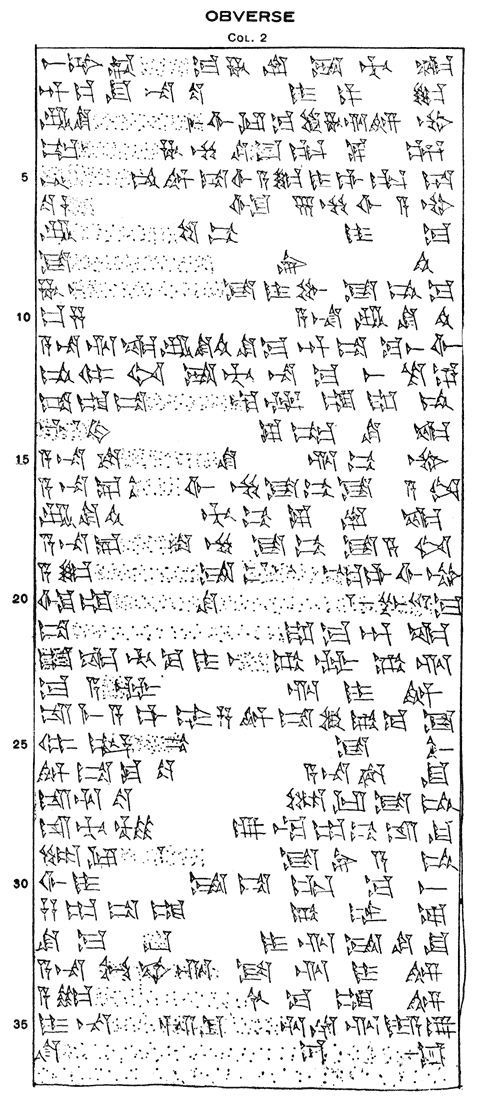
Plate LXV.
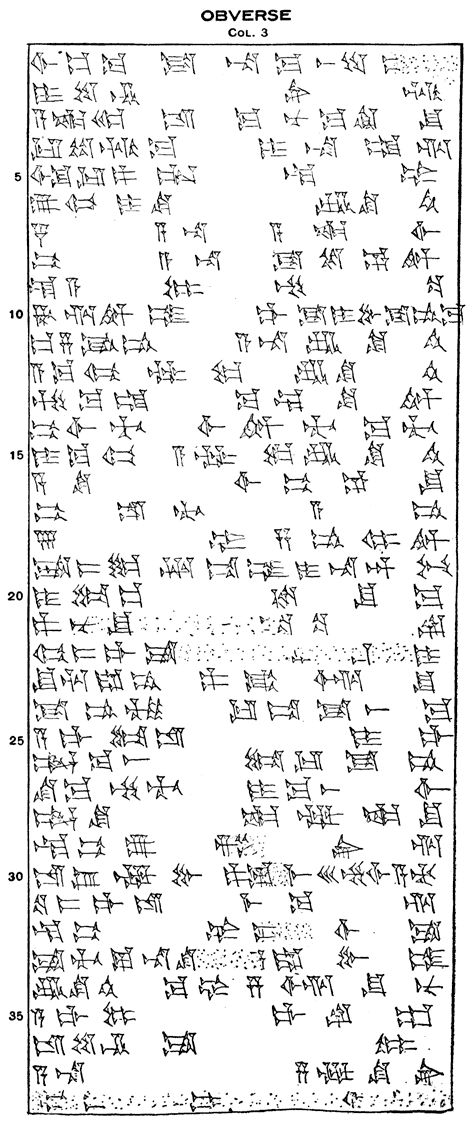
Plate LXVI.
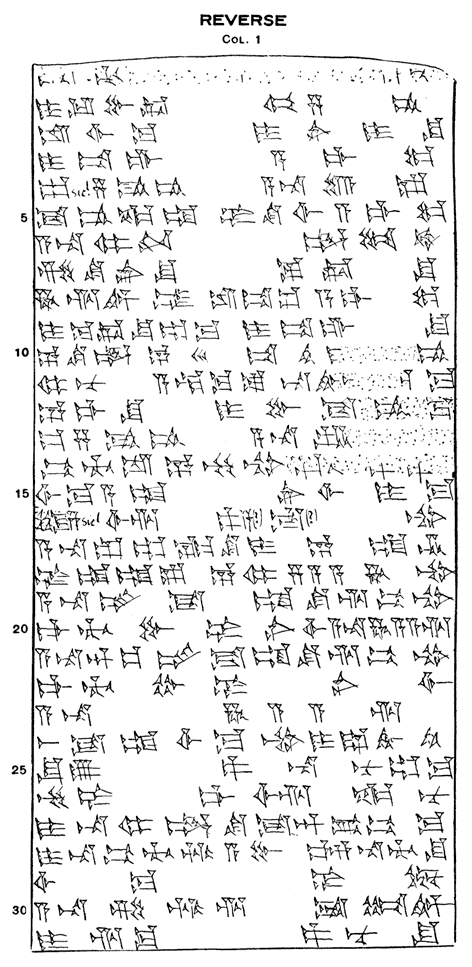
Plate LXVII.
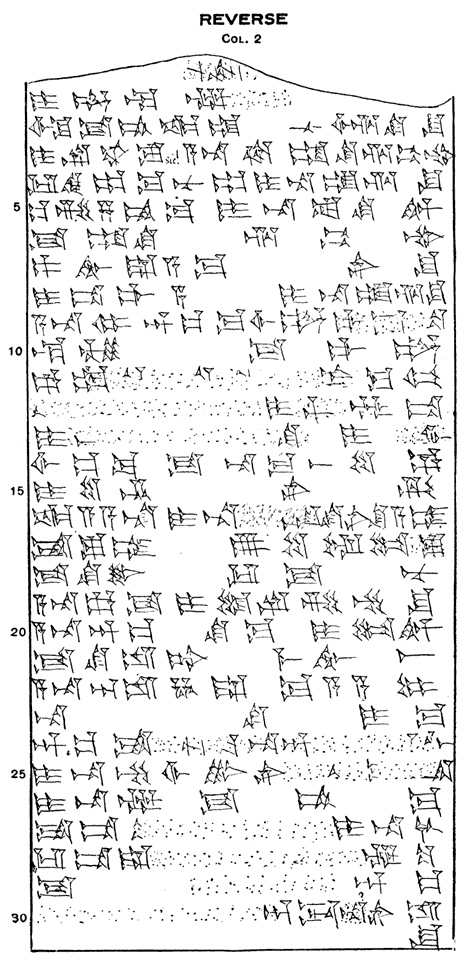
Plate LXVIII.
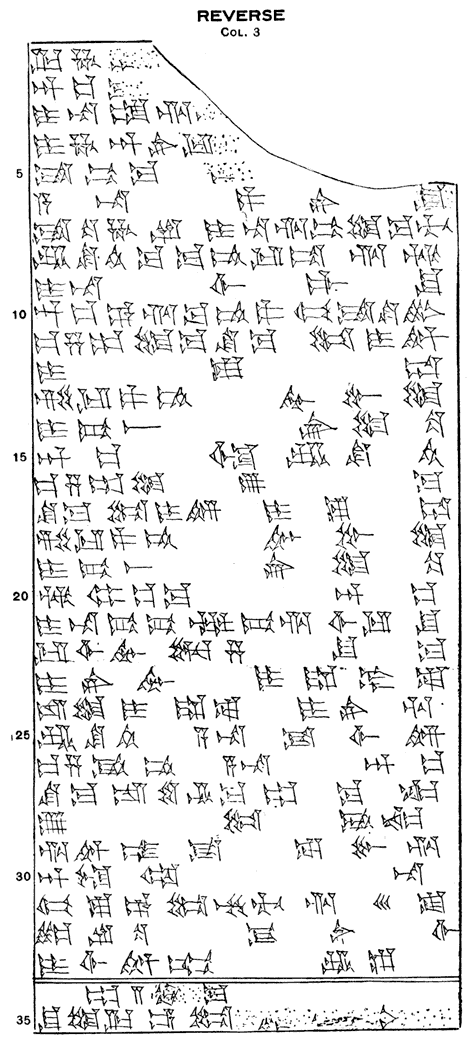
Plate LXIX.
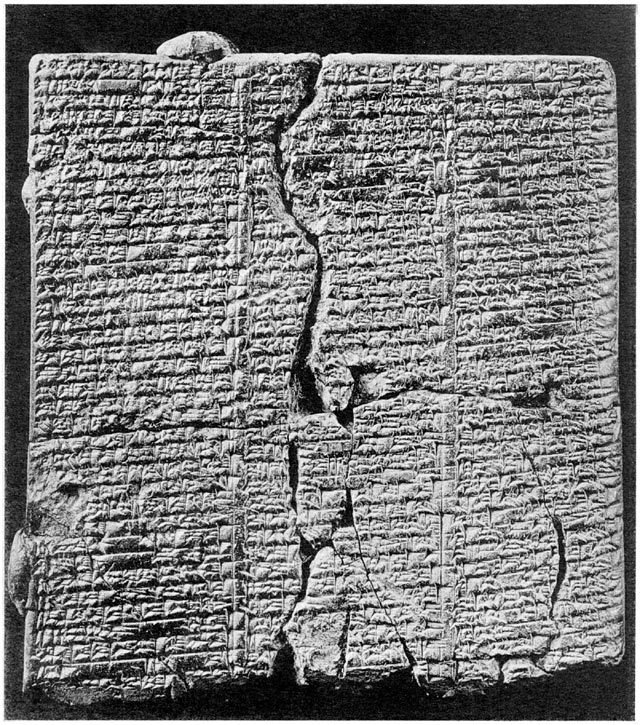
Tablet of the Gilgamish Epic (Obverse)
Plate LXX.
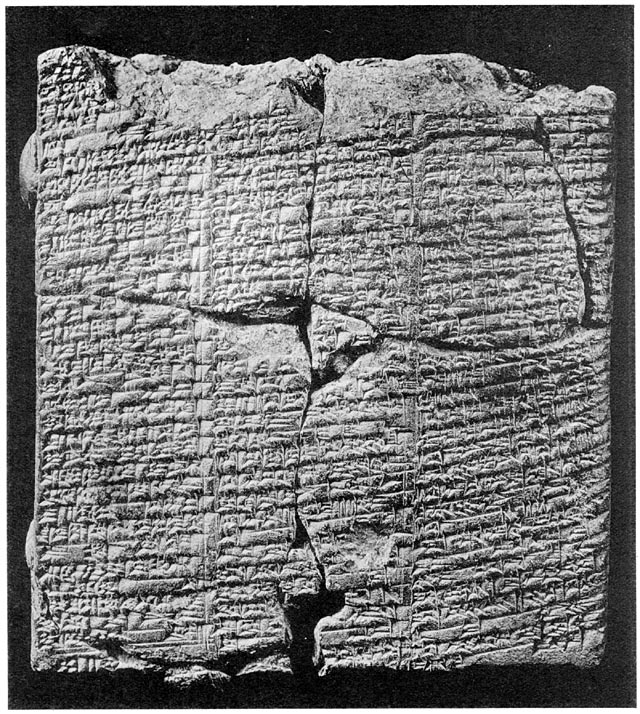
Tablet of the Gilgamish Epic (Reverse)